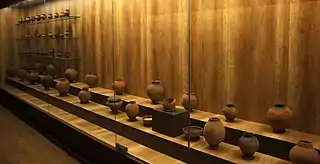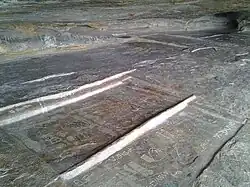
Findings from Adichanallur in the Government Museum, Chennai

3rd century BCE Tamil-Brahmi inscription of Mangulam
| Part of a series on |
| Tamils |
|---|
 |
|
|


Stone beds with Tamil script inscriptions of Jain saints in Sittanavasal, Pudukkottai District, 1st century BCE

| Part of a series on |
| History of Tamil Nadu |
|---|
 |
| History of South Asia |
|---|
_without_national_boundaries.svg.png.webp) |
This is a list of archaeological artefacts and epigraphs which have Tamil inscriptions. Of the approximately 100,000 inscriptions found by the Archaeological Survey of India (2005 report) in India, about 60,000 were in Tamil Nadu[1]
Ancient Tamil Epigraphy
- Burial of Adichanallur, Tamil Nadu[2][3][4] skeletons were found buried in earthenware urns that contained Tamil-Brahmi inscriptions.
- Keeladi excavation site in Tamil Nadu found with Tamil-Brahmi inscriptions in various structures and artifacts, on pottery with Tamil names such as Aathan, Uthiran, Kuviran-Aathan and Thisan.[5][6]
- Anaikoddai seal (steatite seal), Tamil-Brahmi inscriptions mixed in with Megalithic Graffiti Symbols found in Anaikoddai, Sri Lanka, c. 1000 BCE – c. 300 BCE[7][8]
- Potsherds found in Kodumanal and Porunthal[9][10]
- Tamil-Brahmi script dating to 500 BCE found at Porunthal site is located 12 km South West of Palani, Tamil Nadu[9][10]
- Tamil-Brahmi script dating to 500 BCE found at Kodumanal, Chennimalai near Erode, Tamil Nadu[9][10]
- Punch-marked coins of 5th century BCE found at Karur, on the bank of river Amaravathi, is located at 78 km from Tiruchirappalli, Tamil Nadu[11]
- Ancient Pottery dating back to the 4th century BCE have been discovered off shore by marine archaeologists east of Poompuhar, also known as Kaveripattinam is a town in the Nagapattinam district of Tamil Nadu. Kaveripattnam was a thriving ancient capital port city of the Early Chola Empire.[12]
3rd century BCE
- Tamil-Brahmi inscriptions in caves, Mangulam, Madurai district, Tamil Nadu, 3rd century BCE.[13][14][15] There are five caves in the hill of which six inscriptions are found in four caves.[16] The inscriptions mentions that workers of Nedunchezhiyan I, a Pandyan king of Sangam period, (c. 270 BCE) made stone beds for Jain monks. It further details the name of worker for whom he made stone bed. For example, an inscription shows that Kadalan Vazhuthi, a worker of Nedunchezhiyan made stone bed to Jain monk Nanda Sirikuvan.[17] It is one of the protected monuments in Tamil Nadu by the Archaeological Survey of India.[18]
- Artifact related to Early Pandyan Kingdom's King Nedunjeliyan I (c. 270 BCE) found in Kovalanpottal, Madurai district, Tamil Nadu[19]
- Potsherds with Tamil script found in Korkai, Thoothukudi district, Tamil Nadu, 3rd century BCE[20]
- Tamil-Brahmi script dating back to the 3rd century BCE near Thenur, Madurai, Tamil Nadu. Script is written on gold bars.[21]
2nd century BCE
- Black and red ware piece containing Tamil-Brahmi inscription found in Mangudi, Tirunelveli District, Tamil Nadu, 2nd century BCE.[22] The inscription has been deciphered as "Kurummangala Athan yi Yanai Po"
- Potsherds with Tamil-Brahmi inscriptions found in Poonagari, Jaffna, Sri Lanka, 2nd century BCE[23]
1st century BCE
- Tamil-Brahmi script Rock-cavern inscription in Jambai village, Tiruvannamalai District, Tamil Nadu, 1st century BCE. It reads "Satiyaputo Atiyan Nedumaan Anjji itta Paali", In (Tamil: ஸதியபுதோ அதியந் நெடுமாந் அஞ்சி ஈத்த பாழி).[24] The meaning of the epigraph may be rendered as "The abode (pali) given by (itta) Atiyan Nedumaan Anji (name), the Satyaputra (title)". Though the record is a short one in a single line, it throws valuable light on various aspects of South Indian history. The inscription clears the doubt about the identity of the Satyaputras, a dynasty of rulers, mentioned in Ashoka's inscriptions in the 3rd century BCE[25]
- A broken storage jar with inscriptions in Tamil-Brahmi script in Quseir-al-Qadim, (Leukos Limen), Egypt, 1st century BCE. Two earlier Tamil-Brahmi inscription discoveries at the same site, 1st century BCE. The inscribed text is 𑀧𑀸𑀦𑁃 𑀑𑀶𑀺 paanai oRi "pot suspended in a rope net" (which would be பானை ஒறி in the modern Tamil script)[26] as "Muu-na-ka-ra" and "Muu-ca-ka-ti"
- Tamil-Brahmi script Rock Bed Inscription for Jain Monks in Sittanavasal, Pudukkottai District, Tamil Nadu, 1st century BCE,[27] It reads as "Eruminatu kumul-ur piranta kavuti-i tenku-cirupocil ilayar ceyta atit-anam"
- Silver Ring From Karur, Tamil Nadu with Personal Name "Peravatan" in Tamil-Brahmi script, 1st Century BCE[27]
- Megalithic pottery with graffiti symbols that have a strong resemblance to a sign in the Indus script have been found in Sembiyankandiyur and Melaperumpallam villages, Nagapattinam district, Tamil Nadu, 1st Century BCE[28][29]
- Hundreds of potsherds of the Mediterranean region which include rouletted ware, amphorae jar pieces and pieces of red ware with Tamil-Brahmi script have been found in Alagankulam, Ramanathapuram District, Tamil Nadu, 1st century BCE[30]
First millennium AD
See also
- Tamil-Brahmi
- Tamil script
- Tamil inscriptions in the Malay world
- Tamil bell In New Zealand
- Tamil copper-plate inscriptions
- Indian copper plate inscriptions
- Laguna Copperplate Inscription
- Tamil Brahmi inscription of Tissamaharama
- Pallava script
- History of Tamil Nadu
- Chronology of Tamil history
- Tamil Heritage Foundation
- Early Indian epigraphy
- Tamil inscriptions in Sri Lanka
References
- ↑ Staff Reporter (22 November 2005). "Students get glimpse of heritage". The Hindu. Chennai, India. Archived from the original on 18 May 2006. Retrieved 26 April 2007.
- ↑ Chandar, B. Tilak (5 April 2019). "Adichanallur site belongs to a period between 905 and 696 BC". The Hindu. ISSN 0971-751X. Retrieved 20 September 2019.
- ↑ "The ghosts of Adichanallur: Artefacts that suggest an ancient Tamil civilisation of great sophistication". The Hindu. 13 January 2018.
- ↑ "Rudimentary Tamil-Brahmi script' unearthed at Adichanallur". The Hindu. 17 February 2005. Archived from the original on 12 October 2009.
- ↑ "Sangam civilisation older than thought, says new report". The New Indian Express. Retrieved 20 September 2019.
- ↑ Jesudasan, Dennis S. (20 September 2019). "Keezhadi excavations: Sangam era older than previously thought, finds study". The Hindu. ISSN 0971-751X. Retrieved 21 September 2019.
- ↑ Rajan, K (2008), "Situating the Beginning of Early Historic Times in Tamil Nadu: Some Issues and Reflections", Social Scientist, 36 (1/2): 40–78
- ↑ Mahadevan, Iravatham (2002). "Aryan or Dravidian or Neither? – A Study of Recent Attempts to Decipher the Indus Script (1995–2000)". Electronic Journal of Vedic Studies. 8 (1). Archived from the original on 23 July 2007.
- 1 2 3 Roger D. Gwen Robbins Schug, Subhash R. Walimbe (2016). A Companion to South Asia in the Past. Wiley-Blackwell. p. 311. ISBN 978-1-119-05548-8.
- 1 2 3 K. Rajan (2014). Iron Age - Early Historic Transition in South India (PDF). Institute of Archaeology. p. 9.
- ↑ "Chera Site Museum – Karur". Government of Tamil Nadu Department of Archaeology. Retrieved 19 May 2023.
- ↑ Marine archaeological explorations of Tranquebar-Poompuhar region on Tamil Nadu coast, Rao, S.R.. Journal of Marine Archaeology, Vol. II, July 1991. Available online at
- ↑ John D. Bengtson (January 2008). In Hot Pursuit of Language in Prehistory: Essays in the Four Fields of Anthropology : in Honor of Harold Crane Fleming. John Benjamins Publishing. pp. 427–. ISBN 978-90-272-3252-6.
- ↑ Mahadevan, Iravatham (2003). Early Tamil epigraphy from the earliest times to the sixth century A.D. Harvard University Press. ISBN 978-0-674-01227-1.
- ↑ R. Umamaheshwari (2018). Reading History with the Tamil Jainas: A Study on Identity, Memory and Marginalisation. Springer. p. 43. ISBN 978-81-322-3756-3.
- ↑ "Jaina treasure trove in Mankulam village - Today's Paper - The Hindu". The Hindu. 31 December 2008.
- ↑ "மாங்குளம் தமிழ்க் கல்வெட்டுக்கள்" (in Tamil). Tamil Virtual University. Retrieved 23 February 2014.
- ↑ "Protected Monuments in Tamil Nadu". Archaeological Survey of India. Retrieved 25 February 2014.
S. No.8 — Ovamalai Kalvettu (inscriptions)
- ↑ "Kovalanpottal". Government of Tamil Nadu Department of Archaeology. Retrieved 19 May 2023.
- ↑ "Korkai". Government of Tamil Nadu Department of Archaeology. Retrieved 19 May 2023.
- ↑ "Thenur gold treasure found four years ago is 2300 years' old, recent study reveals". The Times of India. 20 October 2013.
- ↑ "Mangudi". Government of Tamil Nadu Department of Archaeology. Retrieved 19 May 2023.
- ↑ Mahadevan 2003, p. 48
- ↑ K. Selvaraj, "Jambai oru aayvu", State Department of Archeology, Chennai
- ↑ "Archived copy". Archived from the original on 7 February 2012. Retrieved 11 January 2019.
{{cite web}}: CS1 maint: archived copy as title (link) - ↑ Tamil Inscriptions Archived 2013-01-17 at archive.today. Archaeologyindia.com. Retrieved on 2013-07-28.
- 1 2 "Tamil–Brahmi Script". Government of Tamil Nadu Department of Archaeology. Retrieved 19 May 2023.
- ↑ Subramaniam, T. S. (1 May 2006). "From Indus Valley to coastal Tamil Nadu". The Hindu. Chennai, India. Archived from the original on 6 May 2008.
- ↑ "Sembiyankandiyur". Government of Tamil Nadu Department of Archaeology. Retrieved 19 May 2023.
- ↑ "Alagankulam". Government of Tamil Nadu Department of Archaeology. Retrieved 19 May 2023.
External links
This article is issued from Wikipedia. The text is licensed under Creative Commons - Attribution - Sharealike. Additional terms may apply for the media files.